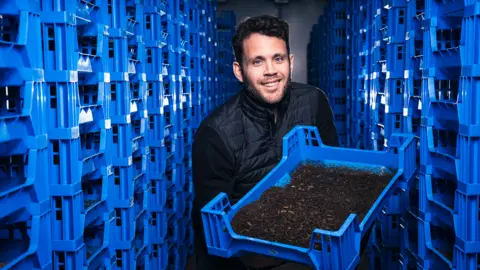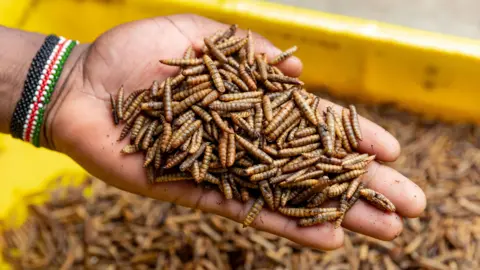AI Insights
Should we be letting flies eat our food waste?

Technology Reporter
 Energesman
EnergesmanMost people are inclined to shoo flies away from food, and the thought of maggots in your bins is enough to make anyone’s stomach turn.
But a handful of city councils have embraced maggots – more formally known as fly larvae – and their taste for rotting food.
In Vilnius, capital of the Baltic state of Lithuania, fly larvae have officially been given the job of processing the 2,700 tonnes of food waste the city’s 607,000 residents put out for collection each year, alongside that of the six neighbouring councils.
Energesman, the waste management company that began relieving Vilnius of its food waste earlier this year, doesn’t actually charge the city for this service.
That is saving the city up to €2m (£1.7m; $2.3m) per year, based on a target of processing 12,000 tonnes in 2026 says the company’s chief executive, Algirda Blazgys.
Energesman has rolled out new orange food waste bags to residents, alongside an influencer marketing campaign to encourage more Vilniečiai to separate their food waste, as the 2,700 tonnes collected is only a fraction of the 40,000 tonnes of household waste the city is thought to generate.
Last year it become mandatory for councils to collect food waste, so the city needs to find ways to deal with it.
Energesman, meanwhile, has plans to turn the fattened fly larvae into a new income stream.
It houses around six million flies in a special zone within its Vilnius plant, who mate around every six hours, according to CEO Algirdas Blazgys.
A female fly can lay around 500 eggs in her average 21-day lifespan, so Mr Blazgys and his team are dealing with more than three million larvae a month, who can consume more than 11 tonnes of food waste in the first, hungriest days of their lives.
 Energesman
EnergesmanIt’s the huge appetites of these tiny creatures that make them such excellent candidates for food waste processing. This study shows a swarm of them demolishing a 16 inch pizza in just two hours.
The trick is to cull them before they transform into mature flies. That way the protein rich fly larvae can be converted into protein products for use in animal feed or industrial use, for example as an ingredient in paint, glue, lamp shades and furniture covers.
Also, their manure, known as frass, can be used as fertiliser.
Energesman has already set up supply trials with partners in the paint, glue and furniture industries, but Mr Blazgys acknowledges it’s proving more complicated than he anticipated.
The sample paint produced using Energesman-reared fly larvae didn’t quite come out in the right colour, but the lamp shades created look promising.
He also has university partnerships in place to supply fly larvae for research purposes and for feeding bacteria. And of course, the larvae are in demand from the local fishing industry to use as bait.
But EU health and safety regulations mean fly larvae fed with kitchen waste can’t be used in edible insect products for human consumption, as there could be cross contamination from meat and fish scraps.
“We came up with some crazy ideas, then we started looking for other people that could also come with some crazy ideas about what we could do,” says Mr Blazgys.
“As it’s still very new, some people are still looking to see if we’re going to fail, so they don’t want to brag about it yet. But I think we’re going to come up with something good.”
While there are numerous cases around the world of fly larvae being used in food waste management, and being harvested as a protein ingredient, it’s largely on a commercial basis, for example, a private contract between a hotel or apartment building owner and a fly larvae rearer.
In Kenya, Project Mila is a social enterprise using fly larvae to tackle Mombasa’s mounting food waste problem, while also supplying frass as fertiliser to local farmers.
Yet there are just a handful of city councils that have adopted this way of processing food waste.
Goterra in Australia has used fly larvae to help Sydney get through its food waste, as part of a limited trial which began this year.
For the past three years, Goterra has also been working with three townships that are part of the neighbouring Queanbeyan-Palerang Regional Council, recycling around 10 tonnes of food waste.
 Flybox
FlyboxWhether we will see UK councils start shipping in millions of flies, so their larvae can munch through the 6.4 million tonnes of household food waste produced here yearly, is only a matter of time.
That’s the optimistic view of Larry Kotch. He’s the CEO and co-founder of insect waste management company Flybox, which he says builds more insect waste processing sites than any other company in the UK, which then work largely with private food manufacturers and supermarkets.
Flybox is also a founding member of the Insect Bioconversion Association, an industry body representing companies in the space.
UK councils are interested, Mr Kotch believes, especially because weekly household food waste collections will become mandatory in England from March 2026.
Around 148 of England’s 317 local authorities still don’t offer this, according to the Local Authority Recycling Advisory Committee.
 Flybox
FlyboxBut regulations set by the Department for Environment, Food and Rural Affairs (DEFRA) are currently barring councils from using fly larvae to process food waste.
If regulation could move in line with science, Mr Kotch argues that “the UK could see its first council-contracted insect plant within two years”.
“Unfortunately, with government it’s always safer to say no… Everyone we’ve spoken to in UK councils are very excited about insect protein and would much rather work with insect farms than alternative technologies.”
DEFRA confirmed to the BBC that the Animal By-Product Regulations restrict insects from being used to process organic waste streams.
It says there are currently no plans to review these regulations. “Our waste management regulations play a crucial role in protecting UK biosecurity and reducing the risk of disease,” the spokesperson said.
The current alternative for sending food waste to landfill is anaerobic digestion (AD), a breakdown process which creates biogas.
However, Mr Kotch says current AD plants aren’t enough to cope with the anticipated influx of household food waste.
“Globally, over 1.3 billion tonnes of food is wasted every year. We believe up to 40% of that could be upcycled using insect waste management. And not only does it avoid disposal costs and methane emissions, but it also produces valuable protein and organic fertiliser,” says Mr Kotch.
AI Insights
‘Just blame AI’: Trump hints at using artificial intelligence as shield for controversies

US President Donald Trump has suggested that artificial intelligence could become a convenient scapegoat for political controversies, raising concerns about how the technology might be used to deflect accountability.
Speaking at the White House this week, Trump was asked about a viral video that appeared to show a bag being tossed out of a window at the presidential residence. Although officials had already explained it was routine maintenance, Trump dismissed the clip by saying: “That’s probably AI-generated.” He added that the White House windows are sealed and bulletproof, joking that even First Lady Melania Trump had complained about not being able to open them for fresh air.
But Trump went further, framing AI as both a threat and an excuse. “One of the problems we have with AI, it’s both good and bad. If something happens really bad, just blame AI,” he remarked, hinting that future scandals could be brushed aside as artificial fabrications.
This casual dismissal reflects a growing trend in Trump’s relationship with AI. In July, he reposted a fabricated video that falsely depicted former President Barack Obama being arrested in the Oval Office. He also admitted to being fooled by a machine-made life-long video montage of himself, from childhood to the present day.
Experts warn that as deepfake technology becomes increasingly sophisticated, it could destabilise politics by eroding public trust in what is real. If leaders begin to label inconvenient evidence as AI-generated, whether true or not, the result could be a dangerous precedent where accountability becomes optional and facts are endlessly disputed.
For Trump, AI appears to represent both risk and opportunity. While he acknowledges its ability to create “phony things,” he also seems to see it as a ready-made shield against future controversies. In his own words, the solution may be simple: “just blame AI.”
AI Insights
The president blamed AI and embraced doing so. Is it becoming the new ‘fake news’?

Artificial intelligence, apparently, is the new “fake news.”
Blaming AI is an increasingly popular strategy for politicians seeking to dodge responsibility for something embarrassing — among others. AI isn’t a person, after all. It can’t leak or file suit. It does make mistakes, a credibility problem that makes it hard to determine fact from fiction in the age of mis- and disinformation.
And when truth is hard to discern, the untruthful benefit, analysts say. The phenomenon is widely known as “the liar’s dividend.”
On Tuesday, President Donald Trump endorsed the practice. Asked about viral footage showing someone tossing something out an upper-story White House window, the president replied, “No, that’s probably AI” — after his press team had indicated to reporters that the video was real.
But Trump, known for insisting the truth is what he says it is, declared himself all in on the AI-blaming phenomenon.
“If something happens that’s really bad,” he told reporters, “maybe I’ll have to just blame AI.”
He’s not alone.
On the same day in Caracas, Venezuelan Communications Minister Freddy Ñáñez questioned the veracity of a Trump administration video it said showed a U.S. strike on a vessel in Caribbean that targeted Venezuela’s Tren de Aragua gang and killed 11. A video of the strike posted to Truth Social shows a long, multi-engine speedboat at sea when a bright flash of light bursts over it. The boat is then briefly seen covered in flames.
“Based on the video provided, it is very likely that it was created using Artificial Intelligence,” Ñáñez said on his Telegram account, describing “almost cartoonish animation.”
Blaming AI can at times be a compliment. (“He’s like an AI-generated player,” tennis player Alexander Bublik said of his U.S. Open opponent Jannik Sinner’s talent on ESPN ). But when used by the powerful, the practice, experts say, can be dangerous.
Digital forensics expert Hany Farid warned for years about the growing capabilities of AI “deepfake” images, voices and video to aid in fraud or political disinformation campaigns, but there was always a deeper problem.
“I’ve always contended that the larger issue is that when you enter this world where anything can be fake, then nothing has to be real,” said Farid, a professor at the University of California, Berkeley. “You get to deny any reality because all you have to say is, ‘It’s a deepfake.’”
That wasn’t so a decade or two ago, he noted. Trump issued a rare apology (“if anyone was offended”) in 2016 for his comments about touching women without their consent on the notorious “Access Hollywood” tape. His opponent, Democrat Hillary Clinton, said she was wrong to call some of his supporters “a basket of deplorables.”
Toby Walsh, chief scientist and professor of AI at the University of New South Wales in Sydney, said blaming AI leads to problems not just in the digital world but the real world as well.
“It leads to a dark future where we no longer hold politicians (or anyone else) accountable,” Walsh said in an email. “”It used to be that if you were caught on tape saying something, you had to own it. This is no longer the case.”
Danielle K. Citron of the Boston University School of Law and Robert Chesney of the University of Texas foresaw the issue in research published in 2019. In it, they describe what they called “the liar’s dividend.”
“If the public loses faith in what they hear and see and truth becomes a matter of opinion, then power flows to those whose opinions are most prominent—empowering authorities along the way,” they wrote in the California Law Review. “A skeptical public will be primed to doubt the authenticity of real audio and video evidence.”
Polling suggests many Americans are wary about AI. About half of U.S. adults said the increased use of AI in daily life made them feel “more concerned than excited,” according to a Pew Research Center poll from August 2024. Pew’s polling indicates that people have become more concerned about the increased use of AI in recent years.
Most U.S. adults appear to distrust AI-generated information when they know that’s the source, according to a Quinnipiac poll from April. About three-quarters said they could only trust the information generated by AI “some of the time” or “hardly ever.” In that poll, about 6 in 10 U.S. adults said they were “very concerned” about political leaders using AI to distribute fake or misleading information.
They have reason, and Trump has played a sizable role in muddying trust and truth.
Trump’s history of misinformation and even lies to suit his narrative predates AI. He’s famous for the use of “fake news,” a buzz term now widely known to denote skepticism about media reports. Leslie Stahl of CBS’ “60 Minutes” has said that Trump told her off camera in 2016 that he tries to “discredit” journalists so that when they report negative stories, they won’t be believed.
Trump’s claim on Tuesday that AI was behind the White House window video wasn’t his first attempt to blame AI. In 2023, he insisted that the anti-Trump Lincoln Project used AI in a video to make him “look bad.”
In the spot titled ” Feeble,” a female narrator taunts Trump. “Hey Donald … you’re weak. You seem unsteady. You need help getting around.” She questions his ”manhood,” accompanied by an image of two blue pills. The video continues with footage of Trump stumbling over words.
“The perverts and losers at the failed and once-disbanded Lincoln Project, and others, are using A.I. (Artificial Intelligence) in their Fake television commercials in order to make me look as bad and pathetic as Crooked Joe Biden,” Trump posted on Truth Social.
The Lincoln Project told The Associated Press at the time that AI was not used in the spot.
___
Associated Press writers Ali Swenson in New York, Matt O’Brien in Providence, Rhode Island, Linley Sanders in Washington and Jorge Rueda in Caracas, Venezuela, contributed to this report.
AI Insights
UAPB librarian leads session on artificial intelligence in STEM fields

University of Arkansas at Pine Bluff librarian Shenise McGhee presented on AI-powered smart tools at the 2025 STEM Librarians South Conference hosted by the University of Texas at Arlington.
This annual conference, held virtually and in person, brings together librarians of science, technology, engineering and math from across the United States and beyond to exchange ideas, strategies and innovations in areas such as library instruction, reference services, collection development and outreach, according to a news release.
As a featured panelist during the virtual portion of the July conference, McGhee presented a session titled “Smart Tools: AI-Powered Pathways to STEM Student Success.”
She explored how advancements in artificial intelligence and machine learning are reshaping education, especially in STEM fields, where data-driven decision-making and adaptive learning are increasingly vital. She emphasized how STEM librarians can harness AI tools to enhance student learning, improve academic performance and promote equity in STEM education.
McGhee examined emerging technologies, including AI tutoring systems, intelligent learning platforms and personalized machine learning applications. She demonstrated how these tools can create inclusive learning environments by adapting instruction to meet individual student needs, delivering real-time feedback, automating instructional tasks and predicting student challenges before they arise.
Her presentation also emphasized the critical role of STEM librarians in supporting the ethical use of AI tools, teaching students how to engage with AI tools critically and effectively in their coursework by providing access to the digital resources that empower student success. Attendees were offered practical strategies, case studies and best practices to integrate AI into library services and student support initiatives.
In addition, McGhee spotlighted the UAPB STEM Academy, a five-to-six-week summer residential program designed to prepare incoming STEM majors for the academic rigor of college and life on campus. She discussed how the library collaborates with other campus departments to support students through targeted library instruction and services that contribute to academic success.
“STEM librarians are uniquely positioned to guide students through the evolving AI-driven educational landscape,” McGhee said. “By integrating smart tools and inclusive practices, we not only improve outcomes, but we also empower students to thrive.”
For more information, visit:
-

 Business6 days ago
Business6 days agoThe Guardian view on Trump and the Fed: independence is no substitute for accountability | Editorial
-
Tools & Platforms3 weeks ago
Building Trust in Military AI Starts with Opening the Black Box – War on the Rocks
-

 Ethics & Policy1 month ago
Ethics & Policy1 month agoSDAIA Supports Saudi Arabia’s Leadership in Shaping Global AI Ethics, Policy, and Research – وكالة الأنباء السعودية
-

 Events & Conferences4 months ago
Events & Conferences4 months agoJourney to 1000 models: Scaling Instagram’s recommendation system
-

 Jobs & Careers2 months ago
Jobs & Careers2 months agoMumbai-based Perplexity Alternative Has 60k+ Users Without Funding
-

 Education2 months ago
Education2 months agoVEX Robotics launches AI-powered classroom robotics system
-

 Funding & Business2 months ago
Funding & Business2 months agoKayak and Expedia race to build AI travel agents that turn social posts into itineraries
-

 Podcasts & Talks2 months ago
Podcasts & Talks2 months agoHappy 4th of July! 🎆 Made with Veo 3 in Gemini
-

 Podcasts & Talks2 months ago
Podcasts & Talks2 months agoOpenAI 🤝 @teamganassi
-

 Education2 months ago
Education2 months agoAERDF highlights the latest PreK-12 discoveries and inventions



